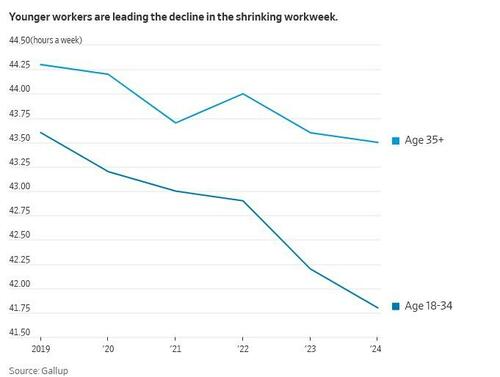While the US labor market defied expectations in September - adding 119,000 jobs according to delayed numbers, the unemployment rate rose to 4.4%, the highest level in four years. Normally, this would be the time for most employees to make sure they're the most valuable asset at a company - especially with layoffs surging and AI slowly replacing entry level jobs across various industries.

Yet, Gen Z workers don't seem to be getting the message. Instead of putting in long hours, many young workers remain convinced that work-life balance is their nonnegotiable right - even as the ground shifts beneath their feet.
Across industries, entry-level employees say they’re not responding to emails after 5 p.m., staying out late on work nights or carving out weeknight pickleball time - behaviors that would have been unthinkable for young workers during earlier periods of economic softening. Managers say the detachment is coming at the exact moment younger employees most need to demonstrate grit, reliability and value, according to the Wall Street Journal.
Damaryan Benton, a 24-year-old at an advertising firm in Los Angeles, checks in with his supervisors before logging off and makes clear he won’t be working after hours. “After five if I’m not by my laptop, I’m not by it,” he said. “I don’t provide an explanation for it, either.”
Nia Joseph, who works at a Houston ophthalmology practice, said she recently stayed out until 2 a.m. on a Sunday - even though she had to be at work before 8. A few years ago, she says, she would have gone home early. “It reminded me that I used to enjoy things a bit more,” she said.

And Jessica Moran, a senior audit associate in New Jersey, said she made sure her manager understood that pickleball practice takes priority during certain weeknights.
"I was asking associates, senior associates and managers questions to gauge their work-life balance and what it truly looked like," the 24-year-old Moran told the WSJ, adding "For me, that means there must be work-life balance here."
The shared theme: Gen Z wants work to adapt to their lifestyle, not the other way around.
Older Workers See Red Flags. Gen Z Doesn’t.
Executives say the disconnect is widening just as the labor market shows unmistakable signs of cooling.
Companies are slowing hiring, eliminating positions and cautioning new employees that boundaries may be blurry. Historically, periods of economic uncertainty would prompt younger professionals to work harder to prove they could be counted on.
“Gen X, when times get tough…what do we do? We work harder, we dig in more, we push,” said Marcie Merriman, founder of Ethos Innovation. Younger workers, she says, expect to be judged solely on output - not effort or availability.
That attitude may have made sense during the pandemic-era hiring boom, when job seekers had leverage. Today, employers say, it risks looking like complacency.
Gen Z Says Loyalty Doesn’t Pay. Employers Say Discipline Still Matters.
Part of the generational divide stems from the pandemic and the rise of remote work. Younger workers entered the workforce during a time when many employers emphasized mental health, flexibility and boundaries. Many watched family members burn out in traditional jobs. Joseph said her parents’ careers “completely took over their life,” a pattern she refuses to repeat.
But managers argue the pendulum has swung too far. In a stable job market, detachment may look like confidence. In a weakening one, it can look like a lack of commitment.
Gallup data shows younger workers are leading the drop in hours worked: nearly two hours fewer per week than before the pandemic. Older workers trimmed less than an hour.
The shifting priorities are showing up in shrinking work hours. Americans worked an average of 42.9 hours a week last year, down from 44.1 hours in 2019, according to a Gallup survey. Those younger than 35 led the decline, working an average of nearly two hours less a week, while older employees reduced their workweek by just under one hour.
Jim Harter, Gallup’s chief scientist for workplace management, said many younger employees “are still feeling disconnected from their employers” despite signs of a tougher market.
A Wake-Up Call Few Want to Hear
The stories of young workers reflect a belief that employers won’t - or can’t - penalize them for inflexibility. Yet the labor market is beginning to reward something Gen Z has been slower to embrace: resilience.
Benton recalls the pressure he once placed on himself as an intern, logging on at 7 a.m., working through illness and sometimes staying up past midnight. Now, he says he doesn’t go out of his way to take on extra work. When a deadline overwhelmed him during his internship, his manager encouraged him to take a break and extended the deadline. Today, he takes paid time off freely and doesn’t worry about after-hours requests.
Employees like Benton and Joseph see these boundaries as healthy. Executives see them as signals of a workforce unprepared for the demands of a more competitive job market.
The question looming over the next cycle is whether Gen Z will adjust—or whether employers will decide to prioritize workers who already have.
Loading recommendations...
